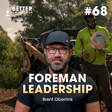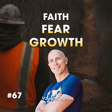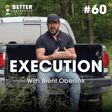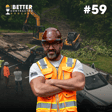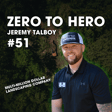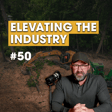Become a Creator today!Start creating today - Share your story with the world!
Start for free
00:00:00
00:00:01

From An Apprentice to a Roofing CEO: How Kalen Whitney Scaled to Success
In this episode we are joined by Kalen Whitney from Whitney Roofing, who went from wiring power plants to building Whitney Roofing into one of the most recognized roofing companies in the Midwest. In this episode, he and Brent discuss the grind of starting from nothing, the power of blue-collar careers, and the creative marketing moves that keep Whitney Roofing top of mind.
#TheBetterContractor #RoofingBusiness #BlueCollarSuccess #ContractorGrowth #RoofingLife #TradesNotDebt #BusinessGrowth #RoofingMarketing #ContractorCommunity #Entrepreneur #Entrepreneurship #Scaling #Business #Success #Roofing #Trades #BlueCollar
Transcript
Introduction with Kaylin Whitney
00:00:00
Speaker
All right. Well, welcome back to another edition of the better contractor today. I'm excited to have Kaylin Whitney on. He is with Whitney roofing. So this podcast has been the works for probably a couple of times already, and we've had to move things around to make it work, but glad to have you on Kaylin.
00:00:12
Speaker
And, ah right well welcome back to another edition of the better contractor today i'm excited to have kayle whitney on he is with whitney roofing this podcast has been in the worst for probably a couple times already we've had to move things around to make it work but glad to have you on kalinn and I'll go ahead and let you kind of kick off what you think is, tell us a little bit about your background, who you are, what you do.
00:00:37
Speaker
So, you knowll kind of goal this podcast is that we're giving other contractors some nuggets of wisdom to kind of help them improve their business, elevate the whole industry together. So, Kalen, I've kind of watched you from afar. You're an hour and a half from where we are. And we have some mutual friends and they speak highly of you. So super glad to have you on. But tell us a little bit about yourself.
Kaylin's Journey into Roofing
00:00:58
Speaker
Yeah, thanks for having me on here. I've actually watched you from afar as well. I've listened to your podcast a few times on my drive to St. Louis. But ah yeah, i and right out of high school, I jumped in the trades. I truly believe in the trades. It's in my blood.
00:01:16
Speaker
Got it right into the IBW Local 146. Took a week out of high school, started in the trade, working in the apprenticeship program. kind of ate, slept, breathed every hour that was available. I took it.
00:01:29
Speaker
I took every opportunity to educate myself and really have loved the exposure that I got from multi-billion dollar projects, coal burners, nuclear power plants, wind farms, natural gas pipeline, oil pipeline, ah fiber optics, temperature controls. I've done it all.
00:01:47
Speaker
um And then with that exposure, you know, i Pretty much got a good grasp and understanding of just the construction overall from the process from the start to finish because but as an electrician you're there when the groundwork is going you're there during the trim outs.
00:02:03
Speaker
So that going into transitioning into the roofing, buddy of mine owns a successful roofing company from where I grew up, Sullivan, Illinois, Central Roofing.
00:02:13
Speaker
He called me up after I topped out. Work was a little slow. He's like, hey, you want to come kind of dabble in this and watch some jobs and just see what it's all about? And kind of, that was about 2013, I believe.
00:02:26
Speaker
And I just quickly grasped the concept of it and really fell in love with the process of being able to help customers. Obviously, I learned the storm industry as well. Whenever a hailstorm comes through and how to navigate the the whole system and process of that and just really helping customers be able to afford a roof that they probably weren't able to afford before that like they could get it for just their deductible so that was very appealing sales always kind of came natural to me honestly in my opinion we're not really selling we're just providing a service so um i don't look at it as sell i'm not convincing anyone i'm just really trying to convince them to work with me i suppose but
00:03:10
Speaker
overall they need, they need something and I'm providing that service. But, um, quickly fell in love with it, started watching all his jobs. Uh, was managing them all. Plus if I was one of his top salesmen and always had a knack for, i wanted to be, you know, an entrepreneurial spirit, I guess.
00:03:28
Speaker
Uh, my mom owned restaurants growing up and managed restaurants and stuff. And I was really exposed to that kind of getting that itch. So i just kind of fell into this and,
00:03:39
Speaker
started Whitney roofing in 20 December of 17 is whenever we were officially started, but didn't start roofing until the year of 2018 was my first season and just kind of hit the ground running. We moved to Effingham to start the business.
00:03:53
Speaker
Um, it's kind of out of the territory of where he was just out of respects to him.
Founding Whitney Roofing
00:03:57
Speaker
And we kind of hit the ground running. I mean, it's been, we started out in a our furnace room in our basement at the first house we lived at in Effingham.
00:04:07
Speaker
And God bless our neighbors. We had at towards the end of the year, i had four dump trailers lying in my front yard and got a letter in my mailbox complaining about the vision around the curve.
00:04:20
Speaker
And that's whenever we got our new, our first office location and kind of grew from there, took over the whole building and then just kind of been growing ever since really. just loving the process and learning the game of the business and just, you know, trial by fire. we no one told us the pathway to go or what the best thing is, but we've done, we've failed a lot and we've learned a lot, but it's been and fun.
00:04:47
Speaker
Yeah. No, love that story and resonate with it. and I think a lot of entrepreneurs and contractors probably will resonate with that because it is kind of a, If you're like me, there was one point if you would have asked me what I was going to do at 43 or 40 years old, i would have said, I just want to own a business. I don't really know what it is.
00:05:05
Speaker
Didn't really have like this grand scheme in mind or an idea. Saw an opportunity and went with it, which is kind of what was happening with you. And, you know, probably started with nothing, you know, as well, just like you.
00:05:16
Speaker
um I can remember back in our first days of my brother's. 14 years older than me, so little bit ahead of me in life. And he had this, he's a farmer and he had this old co-op that he had bought.
00:05:27
Speaker
And I remember our first two or three years, he just let us like, hey, if you'll mow my grass and take care of the place, he doesn't, didn't really use it much anymore. ah You guys can use the back lot and park and stuff. And that's what we did in the beginning. We just had, you know, four or five spots in the back of his place.
00:05:42
Speaker
I used one little office in the corner of his building. And that's how we got started. you know, it was cheap, it was efficient. It got work done and we grew quick. And looking back, you can probably resonate with this, but looking back, that was probably some of my favorite years because it was just the fast growth.
00:05:58
Speaker
You really didn't know what you were doing. you You made a mistake. You learned from it. You picked up, you moved on the next day. And that excitement of that growth was so much fun. um You mentioned one thing early and I'm just kind of curious your take on it.
Trades vs. College Paths
00:06:11
Speaker
You mentioned about the blue collar industry and that's one thing I've been paying a lot of attention to lately. If you look in like college campuses, you know, you're a little bit younger than me, but I remember growing up, everybody, you have to go to college. You have to go to college. If you want to amount to anything, you got to get into school.
00:06:26
Speaker
I'm not dissing school when I say that, but I'm curious. I've noticed there is a change in the world as a whole that is basically saying, you know what? Blue collar is actually also a potential career.
00:06:38
Speaker
And I know a lot of people in a blue collar industry that make a lot more money than people with a college degree to be just completely blunt. um You know, there's, we we have a Facebook group that,
00:06:50
Speaker
with the better contractor. And there's another one called blue collar millionaire. And there's, I don't know, 300,000 members in that group, you know, so a lot of hunger, you know, in this industry to get there, to make it.
00:07:01
Speaker
But I'm kind of curious to see what, where you think that industry might be going. Is it going to continue to grow? there a lot of opportunities out there for guys that want to learn the trades? Just kind of curious what your thoughts are.
00:07:13
Speaker
Yeah. I think there's always opportunity in this industry, whether it's turning the wrench or, entrepreneurial side or you want to start your own company. I mean, I recommend everyone to learn more hands on first before they dive into any business.
00:07:27
Speaker
Just so you kind of know the trials and tribulations and what the how to handle different aspects of a building. i mean, there's but I've seen people have experienced success in this industry with not knowing anything about what they're doing.
00:07:40
Speaker
And they saw me, they just had the ambition to just dive head first take risk. I mean, but just I recommend anyone that's searching or like can't figure out exactly what they want to do to 100% consider the trades. I mean, I was accepted into s SIU, ah Southern Illinois University, whenever Carbondale, whenever I was in high school, I was going to do, had created a landscaping business and consumer economics and that's what i I was going to accept it in the horticulture program.
00:08:15
Speaker
I was going to do all that. And then I kind of got to thinking, and I was like like, that same teacher told me about the IBW and that she'd seen some kids go through it and saw a lot of you know success and start off making money as opposed to starting off in debt.
00:08:30
Speaker
And that just really resonated with me. It's like, you know, that's not a bad idea. And I can learn while I'm making money. And that was very powerful and intriguing to me. It's like, that's a no brainer.
00:08:42
Speaker
Like, and then here I am fast forward, I, a lot of my friends that did go the college route, I mean, which again, I'm not bashing it, but a lot of them work for me or have worked for me in the past and they all have college degrees and I technically don't have a college degree, but I just college isn't.
00:08:58
Speaker
Yeah, it's not what it should be or used to be. It's always just been a Certain people should go to college, but not not everyone. So yeah i feel like it should be reduced down to what really needs college education. I mean, yeah but I won't go on that tangent.
00:09:14
Speaker
No, I would agree with you on that. I think there's obviously you want your doctor to go to college. You want your ah attorney has to go to college. So there's some that for sure have to. And I went for business and it helped.
00:09:28
Speaker
But I'll tell you what, though. In nutshell, I learned more the first year by just trying and doing and failing than i learned in the four years of school. So, yeah. um You mentioned one thing when we were talking, too, about so kind of diving headfirst or some people may say, you know what, I'm going to work in whatever industry for a while. I'm going learn it.
00:09:49
Speaker
And then I may at some point transition into some kind of entrepreneurial ownership. The one thing I kind of did, I was in this industry, a little bit of a different industry, but similar um before I started this one for just one year right out of college.
00:10:03
Speaker
ah Enjoyed it, but I, two things. I knew I didn't want to work for someone else. I knew that before i even started that job. And two, I thought it could be done better. So I, when I quit that job and decided, Hey, I'm going to do this on my own.
00:10:17
Speaker
That was what I kind of focused on was the weaknesses in the industry or things that I thought Why aren't these companies doing it? It can be done. Let's do it. Let's market that. Let's take some market share by doing so.
00:10:29
Speaker
um You kind of did something similar when we were talking before the podcast, like with quality of work and just procedures that you guys do on site. Can you kind of elaborate a little bit on that and how that has helped Whitney Roofing become who it is today?
00:10:42
Speaker
Yeah. um Obviously we try and treat every house like it's our own in the most respectful manner that we possibly can. In doing that, we try on more complex jobs that are steeper, whatever we have, equipters on site, which are mobile dump trailers that can drive around the job site and not run up the yard.
00:11:01
Speaker
And the trash goes straight from the roof into the dumpster, and then we can drive it to the other dumpster and dump it in. And we also use the catch-all system to try and protect the Japanese maples and all the hostas and flowers that they don't want trampled.
00:11:16
Speaker
We put that over those and You know obviously we're doing five roofs a day. We don't have enough yet and our
Quality and Customer Care at Whitney Roofing
00:11:25
Speaker
in our storage. or We don't have enough catch-all to do every location, but we try and piece it out to where, okay, we can protect certain spots that are more important.
00:11:34
Speaker
There's like a valley or like a bay window. We'll protect that and just really take good care. We try and have a specific tarp for the AC units that is a bright orange so you can't miss it um because we have had incidents with that where they ran the Equipter into an AC unit. So we learned from that. We had to buy a brand new ac condensing unit for a customer. And well, now we're going to do a bright orange tarp to protect it and we can't miss it. So it's ever evolving. I mean, we do everything we possibly can to
00:12:06
Speaker
control the the onee unforeseen. i mean, obviously Murphy's law, anything that can happen will happen. And we try and mitigate that the best we possibly can, but it's not a perfect process yet. We're still refining it and getting the people and to kind of be able to walk a project and see all the spots that are a troublesome area and envision like, okay, we should probably protect this and just deploying methods to Protect it.
00:12:36
Speaker
That's been the biggest obstacle is really just, I can walk a project and instantly lay it out in my head, but I don't expect everyone to have that same vision, I guess, so to speak.
00:12:47
Speaker
But my guys that are on site learning to be better about that. so Yeah, ah that's awesome. I think that's what what I've seen with a lot of contractors is what we try to do. What you're doing is they'll try to mitigate and they'll try to be proactive.
00:13:00
Speaker
I've noticed that with a lot of the successful companies, it's that, I call it continuous improvement, but basically where you're looking at your standards, your procedures, you're looking at what you do every day and you're basically asking yourself, okay, this works, you know, we're making money, we're still existent, but how can it be done better? And I think that's what will eventually you guys that are listening think, Hey, how can i and take some market share? How can I grow this company? How can I be better? How can I charge a higher price is by doing stuff like that, being different than your competition saying, Hey,
00:13:31
Speaker
This is acceptable. You know, 80% of my competition does it, but you know what? It's actually a fixable thing for 2% more job cost per job. And if I do that, nobody's going to mind paying 2% more or whatever that is.
00:13:43
Speaker
But do it, make the customer happy, make them realize, or when somebody drives by that job site, they're like, Hey, I've never seen that before. That's different. I like that. yeah Whenever they did my yard, they just dumped it all in the grass and then raked it up and threw it in the dumpster.
00:13:56
Speaker
Yeah. And really refining the, One thing we've been working on a lot in the last few years is refining the customer experience, whether it be follow up emails, welcome emails.
00:14:07
Speaker
We have a thank you for business little goodie bag that we drop off at every full roof replacement. We have our own white labeled coffee brand that's with a local ah shop here in town.
00:14:19
Speaker
They, they made our own blend called the woof top blend kind of on the dog theme. And then we also have our own white labeled, rub that's made from a guy here in town.
00:14:31
Speaker
It's a, just a pork or beef rub that you can put on all your grilled meats and We give that a coffee mug and a couple other things, and that's what we give to every customer as a thank you just for, hey thanks for choosing us.
00:14:45
Speaker
And those are just things that like the final, like, i guess, you know, cherry on top, I guess, to really say, you know, thanks for choosing us. And this is why you chose us is because we do these little things.
00:14:57
Speaker
So just refining that experience and trying to really make it. you know it's it's a daunting task to replace your roof no one really wants to do it but it's whenever you need it you need it so how do we make that experience an enjoyable experience from start to finish and just that's where i think we've experienced a little bit more success and where we create raving fans that like talk to their neighbors about us and like they want them to use us because it was such a great experience i mean obviously you guys do a referral program
00:15:27
Speaker
Yeah, we do referral programs. A lot of our customers actually don't want a referral. They're like, no, I want to throw your name out there so people experience this. I mean, again, it's it's customer service. You're not going to make every customer customer happy. It's not going to be the same experience every time.
00:15:43
Speaker
I mean, there are just some people that are never going to be happy in life. So you do run into those people. But overall, I think our satisfaction rate is pretty high given what we're doing. So, I mean, it's a very fun process. That's really what we've dove into and really like enjoyed is trying to make that better.
00:16:03
Speaker
Yeah. Yeah.
Branding and Marketing Strategies
00:16:04
Speaker
yeah Being from the area um and kind of being in the contracting space, I can say that you were accurate and that you guys have a good, have good image locally, you know, especially for a roofing company, you guys have a really, really good image. And I think,
00:16:18
Speaker
the other thing that you do well, and this is a good transition into it is you guys do an awesome job with marketing. Um, I'm familiar with you through a friend, but when he first told me about you, I'm like, Oh yeah, I've seen their yard signs is what I had seen.
00:16:31
Speaker
And, uh, but tell us a little bit about your marketing process. I think you guys have done a very good job with that. You guys are active on social. Tell us a little bit about what you do and how you think that has maybe helped you guys as far as awareness to customers.
00:16:44
Speaker
um Maybe if that marketing has helped you with hiring as well. I know a lot of people think that marketing is only really with customers, but it can be both. No, it does attract potential hire, hires or whatever you want call them, um potential employees.
00:16:58
Speaker
um But yeah, I think we did a rebrand a few years back. We kind of started with an introduction of Pete, our English bulldog. That's ours. We started putting his actual face on our trucks. Like you sit in the backseat.
00:17:12
Speaker
Uh, we started to using them on our yard signs and having the paw print with Pete approved and then really started seeing that take off. Like whenever we were doing, we were doing neighborhood in Chatham, Illinois and a guy that wasn't our customer and we weren't doing his roof.
00:17:30
Speaker
He drove up on his golf cart and asked where my dog was. So that was kind of like a ah clear sign that it's OK, it's memorable. He he knew that I had an English Bulldog and it was a soft touch. So then we were like ah we went to the roofing process conference that year and they were talking about how everyone has roof logos in their design or everyone has the same color schemes. And so we really started looking into that. you in that storm in Chatham, you start looking down all the yard signs and they all look the same. It's a blue and gray, which was our color scheme and, and or a black and red or blue and gray. It's all these dark color schemes are very similar color schemes with the roof in the picture.
00:18:14
Speaker
It's like, okay, what can we do to make it, you know, just start transitioning? And so we just went all in with the, purple and gold which my son's a vikings fan so i kind of helped with that but uh we doubled down rebranded and it's been one of the best decisions we ever made to just be sticky i guess it's it's memorable you see my purple trip that i have wrapped and people say they see us everywhere because it just sticks out and um in terms of like our marketing with like facebook google instagram we've just started doing our own own stuff like
00:18:51
Speaker
Obviously, there's some stuff that's trending that we've done just to be funny, but there's some things that we've done on our own that are just different. Like we created the other guys roofing and we have some skits that they do that just kind of they're poking fun at like what we actually see out in the world. But it's not us saying it's the other guys doing it.
00:19:09
Speaker
So like they have their own ah persona that they've kind of gone into and they just they're just two chucks in a truck. and they're seeing all the stuff we're doing. They're trying to implement what we're doing, but they do it in ah in a cheaper way. And just, they also do like repairs that are funny, but it's actual stuff that we see out there. So we're kind of like, if you have a contractor doing this stuff, you probably shouldn't hire them kind of stuff, but it's, that's gotten a lot of traction. We've done a lot of good video creation with skits and funny things and just different, a plethora of different things that
00:19:49
Speaker
aren't being done in our industry. I mean, we've done, I think our content creation is, is uncomparable to most people in our industry or what they're doing. So it's really set us apart. People like I had a guy come up to me and and say like, um, that he loves him and his dad go to the movie theater here locally in Effingham. And we got an ad there. And they're like we love your, your commercial and in the ad.
00:20:13
Speaker
Cause it's like, we did it. Everyone else does a little montage of their, of their stuff or whatever. we did like a scary movie intro. So like, and it's, it had the creepy music and, and it really like, it it made you, it gives you the vibes of a scary movie. And it's just like the guy was dragging a, a roofing shovel behind him on the ground and had all like unfolded some stuff. Like he was going to start murdering someone, but it was just all the tools for the trade. And nice it's just, it's creepy, but it's cool. And it's just different, but they,
00:20:47
Speaker
They like came up to me and said, I love your commercial. They just saw me out in town and I didn't even know who they were. So just stuff like that to make – always be in their top of mind because in this industry, for whatever reason, people don't know roofer until they need a roofer.
00:21:03
Speaker
And that you could do – I could do your roof today, and you asked five years later. You probably couldn't remember me because you probably got three or four bids, and you just can't distinguish between them. They all blended together.
00:21:15
Speaker
So we've done things to make it memorable. We've done things to ensure that you remember who did your roof because we give you folders. We give you the shingle tomb so you get a bundle of shingles at the end of the job that's wrapped in a ah branded box that you store it in. We do all these things to so you don't forget that we did your roof. so is And that's really that's what we approach every marketing opportunity with is that we've got to be memorable. How do we You never know what's going to stick or what people going to remember. So you kind of got to show, do different things and throw it out there. But I think that's it.
00:21:54
Speaker
That's been the fun part about it, really. Just finding what sticks. Yeah. And I can speak to that a little bit locally. I can't think of another roofing company. I know there's a ton of them. I don't know one. I mean, so it is it is definitely working. It speaks volumes to what you're doing. And I think lot of people, when they think about marketing, they they believe, you know what, this is something to acquire or attract a brand new customer.
00:22:16
Speaker
I think what you're doing well is you're not only doing that, but you are, like you said, in making things memorable, which keeps you at top of mind. Hey, hailstorm hit. Who do I call? I call Whitney. And you're also doing the part where you're trying to retain.
00:22:30
Speaker
I don't think enough people market or put the effort into retaining the employees. I know like Atlantic Court, for example, like we do Christmas gifts. like They're legit. Like they're actually... I get stuff from people in the mail sometimes and it literally just goes straight to the trash because it's junk. It's something they bought off of. I won't name names, but they bought off some of those places online. It's just junky stuff that has a logo on it, it one or two uses.
00:22:53
Speaker
We actually will go out and name brand stuff that these people actually want, put a logo on it. Sometimes it's very inconspicuous even, you know but it's something they desire to have that says thank you, number one, you know for your you know commitment to us that year.
00:23:08
Speaker
Then it also it's something they'll actually use for years to come. And that little logo is in the bottom corner and they just keep seeing it a little bit over time. But is it expensive? Yeah, it's several thousand dollars every every Christmas that we spend on that.
00:23:19
Speaker
But again, it goes back to it is something to help retain those ah customers instead of just putting all your marketing efforts on attracting new. So I do like what you're doing there. And I love...
00:23:31
Speaker
the The other guys think that's genius. Yeah. It's fun. Especially the contracting world. I feel like that's a genius way to highlight. Yeah. You may have got a much lower bid, but here's what that probably kind of satire. This is what that looks like. Yeah. That's, and that's the whole, we're, we have fun with it. They do funny things. where They've done some like fireworks skits and other things. And we're just, we just have fun with it. mean, like we're, no one else is doing that.
00:23:57
Speaker
People love whenever we launch those. i mean, it's been a while since we've done one, so we might be doing one soon. um But it's just again, it it gets it's like subliminal messaging. Like you're you're you're not talking about roofing while talking about roofing.
00:24:13
Speaker
So like ah it's it's catching their attention without actually saying, hey, you should buy from us. Now they'll remember you because that funny skit instead of just jamming down. who Here's a picture of our roof.
00:24:25
Speaker
Here's a picture of Ruth we did yesterday. So, i mean, we still do that stuff, but that's just not, I mean, you got to do stuff that are different. You got in any industry, really, like truck wraps and doing stuff that's sticky and just really always putting yourself out there. I mean, I'm pretty much always wearing the branded shirts. I mean, I go to my son's, I coach, I'm a assistant coach for my son's baseball team. I go there in my truck. I go,
00:24:53
Speaker
I'm wearing my stuff, but so like all the parents know that I'm there. And so it's just constantly put yourself out there, but yeah. Yeah. But yeah. i like that. can think of a couple other industries where they've done, you know, not necessarily just like the other guys, but they've done something that's just different. You know, if you look at like,
00:25:09
Speaker
Black Rifle Coffee, you know, they blew up. And they blew up because their marketing was so different. You you you wanted to watch it. Did it have anything to do with coffee? It had nothing to do with coffee. You know, there's so many other brands like that. There's a kind of a clothing brand that like, Flag North Fails, the name of it.
00:25:26
Speaker
Same thing. Like they, one there they had one video where they literally buried their Ford Raptor in like a ravine, built two humps up, and then took their Porsche 911 and ramped over the top of it.
00:25:39
Speaker
I watched it. Does it have anything to do with clothing? It nothing to do with clothing. Do I buy their stuff? Yeah, I do. yeah So anyway, it's kind of a good example couple of examples of that. but yeah ah I'm just curious. Do your guys film those things? And how do you get the guys?
00:25:54
Speaker
So we try to get our guys to be involved too. And I will say it's sometimes hard to get these blue-collar guys to be on video. Yeah. um it's It's our production or our job watchers that are actually the guys that do it. And they actually have...
00:26:09
Speaker
Dove headfirst into it and they enjoy it. It gets them away from doing the day-to-day stuff, but and it's fun and creative. ah We do have a ah content creator that's a full-time employee. He does our video ads and stuff, but he also, like, he's the guy that, like, does the final inspections and gets the drone photos at the end of the job and goes and just, you know, drops off that swag bag I talked about, but he's just, like, one of our last touches.
00:26:37
Speaker
So he's out doing that, but he also does our content creation. My wife does a lot of the content creation as well. um But getting some of the guys, it's a little harder, but those two in particular have been jumped in and been very well to like work with. and And they come up with some of the ideas actually, as we're kind of doing the video, like, Hey, we should probably do this. So, I mean,
00:26:59
Speaker
It's been a team effort, but overall we we have pretty good success with getting everyone. That's awesome. That's awesome. ah Next question
Employee Retention and Work Culture
00:27:08
Speaker
I had for you. So a lot of contractors are struggling and it's been a little bit ever since COVID for most people, but finding help and then retaining that help. And I'm just curious how that has been for you guys. If you've had success in it, what would you attribute that to success to?
00:27:25
Speaker
Honestly, the best success we've had is just like, it kind of snowballs from getting, you know, one employee starts and they really like working here and then they start spreading the word. And then we've acquired their friends, their family, like, uh, our old, our last secretary, we got her, her boyfriend at the time was working as a plumber.
00:27:51
Speaker
just felt underappreciated and didn't see any potential for growth. And he came on board. And then since then his brother came on board and now we have a, uh, uh, the husband and wife working for us at one's a secretary, one's the content creator.
00:28:08
Speaker
Um, we have just friends of those people working for us two or three friends from them. I mean, it just, really been once we've had that culture and then they know that they have high performing friends that just aren't satisfied where they're at, we've been able to actually hire people starting out higher than what they were already making where they were working and still increase their lifestyle, but also like give them potential for growth. We have, you know, increase in pay every year. We have opportunities within the business and never, you know, we were always growing. So there's always opportunities if they're willing to take it.
00:28:43
Speaker
But I mean, far as retention goes it's just really being transparent and creating a fun environment like the people want to come into i mean it's not always rainbows and sunshine but it's construction it's ever-changing and if you like that and you like being different in a different place every day it's it's a blast like so i think it's it's intoxicating to an extent like you're you've never seen the same house more than once i mean you're You're always out going. you're You're seeing different complexities and meeting different people. We're in different towns. We cover about a two-hour radius, so guys that are hit live here in Effingham that never really experienced Springfield or other towns and in Illinois, we're there all the time, so they're getting exposure to different towns, and it's just fun.
00:29:28
Speaker
So I think that's it's once you're in it, you're kind of get the edgech and you love it. So. Oh, yeah. I think the trades is interesting. you know, that's kind of how we are, too. We work, you know, obviously around here. But then because we're in the pipeline world, we go other states as well. And travel can get old. at the same time, it's like you said, no no two days are ever the same. ah The job site is rarely the same from day one to day three on the you know same project.
00:29:52
Speaker
Because moving down that pipe. But speaking to culture, I will say, too, i We've had a lot of success in that over the years. I can think back to some of our best people you know in the last 10 years, and a lot of it has been ah hire from someone we already employed that was happy, that we liked, that fit our culture.
00:30:12
Speaker
And they said, hey, you know what? I got this friend, and we bring them aboard. Or we've had hires from people we've just observed out in public, um our safety guy, for example. He was a contractor.
00:30:23
Speaker
ah He was probably, I don't know, early 50s, late 40s when we hired him. And he's like, I'm just, my body's tired. I need office job. This is the end the project.
00:30:34
Speaker
And we approached him. He approached us actually both. And he's like, I want to work. I need to do something different. I said, I don't even have a position for you yet, but you are good enough. I am hiring you and we'll figure it out later. And that's what we did.
00:30:46
Speaker
yeah And now he's our safety guy. He thought he was terribly underqualified to do safety because He's Dan. But what we learned was he's actually very qualified because he's an excellent communicator. He understands he's proactive and he gets stuff done.
00:30:59
Speaker
So anyway, it's amazing sometimes how just paying attention to people around you, sometimes that perfect employee may be, I don't know, at the restaurant literally that you go to and they just are looking for something different.
00:31:12
Speaker
Yeah. One of my hires was, Actually, he's a sales rep now. He started as a production manager or project manager. um He was the guy that did all my my truck accessories.
00:31:24
Speaker
And i just interacting with him, I enjoyed every time we talked. And he kind of is like my brother from another mother. We almost look like twins. like We get confused a lot. But he's been a great hire. I mean, he's and he's local. But just he kind of just interacting with him was pleasant. And I was like, man...
00:31:44
Speaker
you're ever not happy here, like talk to me and I've kind of acquired guys like that. Like my production manager, um he was working it at Sloan's implement selling John Deere tractors. And he's a buddy of mine from school. His mom was my mom's boss growing up.
00:32:01
Speaker
We played sports together and I was like, Hey, If you ever are looking for a different opportunity, I think I got a spot for you. And he came on. He's been one of my favorite assets that we've acquired. And he's almost, he's one of the longest employees so far, but he's taken on a lot of roles and I've known him for a long time, but he's been a great hire. And, but he didn't have any experience in construction.
00:32:23
Speaker
Like the first day on the job, he was watching a project and, and he calls me, and he was at Menards doing a material run. And he's like, They asked for some OSB, and he's like – he's calling me like, is this three-quarter-inch treated plywood? Is that what I need because it's outside? I was like, no, dude, it's being covered by shingles. It doesn't need to be treated. was like, that's the most expensive sheet of plywood you could possibly buy.
00:32:47
Speaker
So he had no understanding of that, so I had to, like, talk him through that. So, but I enjoy that. I like people that don't know nothing and I can teach them our ways. So that's. you go. Yeah. You train them, train them your way.
00:32:58
Speaker
Yep. Yeah. No one, a lot of the guys that we have that work for us literally had zero experience in construction per se, other than like our carpenters. Yeah. like They they've been learning on the job. So it's been, it's been fun.
00:33:10
Speaker
So yeah. Yeah. Yeah. Another question I had before he was talking beforehand and kind of had some, you've got some kind of new news. So you probably, if you guys have listened to podcast, now you've heard me talk a little bit about mergers and acquisitions. You've heard me talk about systems and processes.
00:33:26
Speaker
um For those of you who are owners, you're usually looking to do one of two things, either grow your company and hand it down to another generation and keep that growth going. Or you're saying, you know what, there's a huge growth potential here.
00:33:40
Speaker
for potentially either a merger or an acquisition. And by doing that, we can blow this up even faster, bigger than we even dream possible. I just gotta to bring on some new partnerships. So tell us a little bit about what has been going on in your world with that lately and kind of what you feel if you're someone on the other side and you're listening to this and you're saying, you know what, my industry's kind of doing that consolidation as well.
00:34:03
Speaker
What do I need to be doing now in order to be someone someone else wants to acquire or partner with later?
Private Equity and Growth in Roofing
00:34:08
Speaker
Yeah, I think just honestly having consistent growth is one thing that they'll look for. They're going to look for a trend over like the last three to five years. And if you had growth in mind and they have a certain EBITDA that you typically would want to be at, you want to be at roughly a million dollars EBITDA is like the sweet spot to really get your best return on or basically the best dollar that you can get.
00:34:38
Speaker
as far as the acquisition goes. um But, and they're going to be looking for companies that are consistent. They have developed processes and systems and all that stuff for the, to keep growth in mind.
00:34:53
Speaker
um They're, those are a few things that they're looking for, but I mean, they're also going to come in and interview you, talk to you. And i mean, it's, it's, an The roofing industry right now is very attractive to private equity, just in in terms of the the growth potential and what's really happening in our sector.
00:35:11
Speaker
It's evolving. It's kind of like one of those blue collar industries that are really like the HVAC industry kind of did it first where they they start implementing technology and CRMs and and really getting with the tech, you know, more technologically advanced per se than what the roofing industry was. We were kind of stuck in a time lapse or whatever.
00:35:32
Speaker
But now we're catching up to that and we're getting CRMs and implementing and really developing businesses worth buying. So like they're we're more attractive to them because of that. So like we're I remember when I first started, it was all handwritten estimates. And this is only 2014.
00:35:49
Speaker
And it was that way when I left, it was still handwritten contracts. We just started like invoice to go was our first technology that we were using. and it was real, I had to manually enter everything. Now it's like plug and play with our CRMs where it's real, you can streamline that process and be cranking out estimates faster. So that's been what I think has made us more attractive is that implementation of technology. and and But making sure that you are adapting to that if you are in the construction industry and not being afraid of change, trying out new CRMs.
00:36:23
Speaker
i mean um blown away by some of the contractors that I talked to that aren't using a CRM. Like, what are you doing? Like, they're still using like QuickBooks as their invoice and their estimating platform. And i was like, dude, like you can create these proposals that blow customers away and you can systemize it. So like just really adapting technology, implementing it and actually developing it slowly. I mean, it's I've been with job Nimbus since I first started out.
00:36:50
Speaker
I was grandfathered in on their pricing as they've grown, I've grown. um but having all that kind of stuff and really getting to know your numbers know that you have growth in mind um and also like be wanting to grow so if they're going to acquire you they don't want someone that wants is comfortable i mean they want someone that is willing to do what it takes to grow because they want to grow your business so if if you're just fine and content with where you're at you think ah i'm good then
00:37:23
Speaker
probably just want to be acquired, not acquired, but just bought and step aside and let them just take over the company, which is an option as well. You can always sell to them and just tell them like, hey, I don't want, I don't want to do anything with this anymore.
00:37:37
Speaker
So they'll acquire you and they'll find a replacement for you. But so, I mean, don't be afraid of that option either if that's what's in your, in your game, but um just really knowing what you want to do and and be willing to grow is the biggest thing I really, i mean, and know that they're, they're gonna, they're gonna fast pace that. So like, I know, i mean, we've been trending growth every year since I've been in business. I mean, we've plateaued some years, but we've really always been trending up and it's all been organic growth. We've never had forced growth.
00:38:11
Speaker
So it's, we've controlled our chaos, but I know that with them on board, They can take me to the next step faster with and more accurate, I guess, so to speak.
00:38:25
Speaker
They're going to get me to that next level without me guessing that this is the next step I need to take. They're going to this is the next step you need to take. Here's how we're going to do it and create a pathway to get to that next level and really help you get a new location, greenfield new locations and take all the risk. And i can kind of hedge my risk as the owner and not take all the financial risk.
00:38:46
Speaker
and it's on them and they're kind of doing it educated and I'm not just guessing on it. So, yeah. and So will you still be over the day to day? Yeah, I have to be like, just so I'm still, I still run everything. It's all going to be through me. Like I'm part of the acquisition.
00:39:03
Speaker
So I am the, you know, the, the boss. I'm still, I mean, I have people over me, but I'm still who you'll see. I'm still running everything and making sure that we're implementing what they're talking about and I'm still the acting CEO of, of my company.
00:39:19
Speaker
So nice yeah. And that's, that's part of it. Like I'm tied to the contract of this acquisition. Like i if, if I were to die tomorrow, literally like the, there's obviously some things set in place, but if I die tomorrow, it's, there's going to have to be someone that takes over my role and yeah they'll figure things out. But like I am yeah the acquisition of sorts. Okay.
00:39:41
Speaker
That's cool. And I will say, kind of going back to the the earlier question the podcast about blue collar, I think this here is kind of in the same vein, is that private equity is also looking heavily in the trades.
00:39:53
Speaker
And I've noticed that, like, we've had offers so far, I have not taken any of those. But private equity is very, very interested in the trades as a whole. And I think it's because they see a future in the trades. So, you know, when you look at, like, the labor talent and the amount of people that are kind of transitioning to realizing that, you know what, I can actually make six figure in the trades and not have a bunch of debt to start off with.
00:40:17
Speaker
um So you have that aspect, but then it's kind of backed up for me when I see private equity saying, you know what, we also see something in the trades industry and we're willing to put money behind it. So I think that's cool. The systems and processes, I agree with you 100%.
00:40:32
Speaker
So many contractors and we preach it on this podcast, probably one out of two podcasts is you've got to have those systems and processes in place. So you're not letting customers slide away. You actually are having that touch point like you talk about.
00:40:46
Speaker
You're following up with them. When you say you're going to send an invoice or proposal, you actually do it by the time within the timeline or time frame that they think they should get something. It just makes things things run smoother. Like you said, I think you made a comment about it being like a machine.
00:40:59
Speaker
That's what systems and processes do. Think about a car. you know It's got a transmission, an engine, coolant system. It's got all these different things. They all work together to make that thing go however fast you want to go down the interstate.
00:41:11
Speaker
A business is really the same way. It has to have all the functioning parts they all have to work and work together. Yeah. And I think to touch on what you said, like it the touches, I think the, i know the old statistic used to be like seven impressions is what you needed to actually make a buying decision.
00:41:27
Speaker
And I think now there's with our attention span and social media, the way it is, ah think now the average has gone up to about 13 touches is what you need impression wise to Wittgenstein, Be memorable and have them say whenever they need whatever you're providing they'll remember you after about 13 impressions, I think that's the number i've heard.
00:41:47
Speaker
Chris Wittgenstein, always stay on top of mind and finding ways to have those impressions is very important and finding how you can. what avenues it takes to get there. Like we're on Hulu. We do, we're on WAND, WCIA, the local news. Like they see our ads during football games. They see, I get calls all the time of, hey, we saw your ad on during the Illini game.
00:42:09
Speaker
So those are all very important touches too. So just things like that. coming from people in all angles to really capture those opportunities is huge. Yeah. Yeah. I think, yeah, yeah. So there's multiple touch points, but then like you said earlier in the podcast, you guys are also a memorable logo, you know, like you said, with the dog, the colors, everything is is memorable. So not only are are they seeing it, it stands out from all the other ones.
00:42:34
Speaker
So, um, we talked a little bit about innovation and kind of being different. And that kind of led me to my kind of final point here is you've also invented something and working on a patent.
00:42:45
Speaker
Tell us a little bit about that. Yeah. So it's, uh, it's called the hurry tarp. It's a play on words, hurricane hurry tarp. So you can hurry up and tarp. Um, the traditional methods of tarping consist of blue tarps, sandbags, uh, felt paper, whether it be synthetic or tar paper, whatever the contractor has in their truck and some cap nails.
00:43:09
Speaker
and or some method of fixing it to the roof, whether you're nailing it down, weighing it down or doing any of this. And especially like the the Florida market with tile and stuff that that methodology is very broken.
00:43:24
Speaker
You're walking across the roof, spreading the tarp out. You're having footfalls and incidentals. You're breaking the tiles. You're you're creating damage whenever you're nailing into the roof.
00:43:35
Speaker
you're causing unnecessary damage. It's necessary, but unnecessary. Some contractors will take it beyond what ah is necessary to mitigate the problem. Like my guys know to like cut it specific to the area that needs tarp.
00:43:47
Speaker
There are some contractors that have a 20 by 20 tarp. Say it only needed a five by five tarp. Well, they're going to put that 20 by 20 tarp up there, nail it down, ruin that entire elevation.
00:43:59
Speaker
They make sure that they go over the ridge instead of tucking under underneath some shingles. So then they can get insurance to cover the other side of the roof because well, I had to tarp it to mitigate the damage. so they there's all these pitfalls and problems with the traditional methods of tarping that like kind of harness or like harbor that way of thinking to where like it's not fraud. It could be fraudulent essentially because you're creating unnecessary damage. But my answer to that is to create a standardized process to
00:44:32
Speaker
Storm mitigation, whether it be a tree falling through or some wind damage or what have you. It's a water ballasted tarp that you fill up with water. It's, it's a, I think it's the bottom layer is 27 mils and the top layer is I think like 14 mils thick.
00:44:51
Speaker
So it's more than double the FEMA regulation for what they require for hurricane tarping. I think the standard is seven to 20 mils thick. So I'm, I'm more than double that.
00:45:02
Speaker
It meets all that standards. It's PVC, so if you get a hole, you can weld and, you know, use a heat welder to fix it. The bottom layer is obviously thicker to protect it against whatever surface you're putting it on.
00:45:15
Speaker
i mean, you walk it up the roof, you spread it out wherever you need it, and you fill it up with water. It's got grommets, so if you need to attach it to, like, the gutters, you can take a rope down on the other side.
00:45:27
Speaker
as a secondary attachment. And then you need to do a mid roof application, you can, it has a larger flap on the top side that you can tuck underneath the course of shingles or tile. Um, there's, it just, and it's being weighed down by water that you add to it once it's in place. So it's about, think around 40 pounds when you carry it up on the roof with a custom made backpack.
00:45:49
Speaker
And then once you get it up there and roll it out, you fill it up with the water because the hose can already be pre-energized. So you've already got water pressure on it and just plug it in and you let it fill up and it takes about 10 minutes full time setup for a 10 by 10 tarp and it just kind of it stops all the unnecessary damage because an adjuster can come like traditionally an in adjuster will show up on the job say that you already applied the tarp and the traditional methods well they need their own photos so they're going to ask you to remove the tarp you already put on
00:46:22
Speaker
And then you got to reinstall that tarp and you only get paid once to tarp it. So you're having to do double the work. You're causing more holes, more damage to the roof and insurance may or may not pay for that.
00:46:34
Speaker
So now you've, as a contractor, you're on the hook for the damage that you created and insurance is on the hook for the damage you created sometimes as well. So it's, I think it's just something that needed to happen. I mean, it's not a perfect answer, but it doesn't apply to every application it's it's a i do have a 10 by 10 tarp and a 20 by 20 tarp i know that like if it's widespread wind damage it's not feasible to use this but say you have a tree fall through or you do have some cracked tiles or you do have that is in a centralized location it's 100 the answer so yeah that's awesome and i think the kind of core part of that story is actually very applicable to business and that is
00:47:17
Speaker
What you were basically doing was finding a problem and providing a
Industry Solutions and Work-Life Balance
00:47:21
Speaker
solution. So I think in business, I think that's what we should always be thinking, even as we do the continuous improvement and stuff like that is to look back and say, what is the problem that still exists even after I've been there, done that?
00:47:32
Speaker
What is something I can fix and do better? And I think as long as it's we as business owners are always thinking that way. How can we better provide solution or more solutions to our customers or the industry, the better. And that's just another prime prime example of that. so And I think it just, it stops breeding that way of thinking. Cause I mean, the insurance industry and and when it comes to tarping, they pay per square foot.
00:47:58
Speaker
So like the more tarp I put up, the more money I make as a contractor. So it's almost like, Well, I'm going to put a 20 by 20 tarp on there because I make more money for that 20 by 20 tarp.
00:48:09
Speaker
Whenever you know well that you could have done 10 by 10 tarp and have been sufficient for what needed to be mitigated. So if if there's some way to standardize that process and and say okay if if insurance will adopt this tarp as their standard operating procedure, like say that like, okay, we see that you did a 20 by 20 tarp, the traditional method, but we, after removing it, a 10 by 10 hurry tarp would have been the answer.
00:48:39
Speaker
We're only going to pay for a 10 by 10 hurry tarp to be installed. And you're going to be on the hook for the 20 by 20 that you, you've caused damage for. So it it'll be a give and take. I'm not saying that you know There are times that kind of you know it's an emergency situation. You just got to do what you got to do. like It's not a one-size-fits-all, but I think if we can make it to where everyone has the approach that they're trying to be completely honest in the mitigation process instead of trying to take advantage of the system, like it's I think if we can standardize that and really move people towards that, then I think it's better for everyone involved. It's not just for the insurance. It's better for the contractor. It's better the for the customers.
00:49:21
Speaker
The customer knows that whoever's doing this storm mitigation has their interest at heart, and they're not doing it just for the financial gain that can come from doing that. Because there are times where you get on a discontinued shingled roof, and a contractor could very well cause a little bit more damage so they can ensure that that gets paid for.
00:49:39
Speaker
and that's And that's not cool. like i I'm all for taking – not taking advantage, but I'm all for – helping and you know doing what is necessary to mitigate it and helping the customer out but like to try and push the envelope on what is acceptable like i'd like to standardize that to be honest that's yeah i don't like that side of the industry that that is something i mean tree service companies are one of the the top it's not just companies that do that tree service companies they'll put on unnecessary tarps and they don't even do it the right way they put it on top of the roof with nails that aren't supposed to be on there and
00:50:19
Speaker
They don't even tuck it underneath the shingles. It's like, well, this isn't even, it's not shedding water. yeah You just put a tarp on there and nailed it down. like So it hopefully and it'll help with that too. Cause it it's user-friendly. con a customer can use it. Like they can get up there and install this tarp. If it's a walkable roof, it's that easy to do. Like I had my wife install it and she, she doesn't walk on roofs every day.
00:50:45
Speaker
had her do it just for a video and show that so easy ah you know my wife could do it so that's awesome and it's a great example of something you're trying to standardize that will make the industry better as a whole you know yeah having that like hey this is how it should be done don't do it like like the example you gave us some three companies yeah this way yeah even if even if it's not that product's not the one that's used if it harbors the thought process to be better if if now they know that they're being held accountable and like hey they're going to say that a 10 by 10 hurry truck would have been sufficient. So let's only do that 10 by 10 area.
00:51:20
Speaker
Like, if it stops people from doing the unnecessary amount, that's ultimately the goal. Like, yeah, just just do what's right. Like try and and not go too far and push the envelope and try and, you know, ask for forgiveness later. Like, no, come at it from approach of service and actually providing a service that's got some integrity with it. And that's,
00:51:43
Speaker
i I'm not trying to say that everyone should use the hurry tarp. It's again, but I think that something needed to be changed in that aspect and hopefully it catches on and it just, yeah.
00:51:54
Speaker
Yeah. Yeah. Yeah. yeah Well, Caitlin, as we kind of wrap up, the last thing I had for you was really, I'm just going let you fill in the space. So what is something you've been in business a little over 10 years. It sounds like what is something that,
00:52:10
Speaker
Someone in between Kaelin 10 years ago and Kaelin today, what is something you learned in that timeframe that someone in that same, in those same shoes would love to hear from you today?
00:52:21
Speaker
Piece of advice. i mean, there's a lot of things, I guess. Just ultimately finding your why and staying true to that.
00:52:32
Speaker
There's at times whenever you're in the business and you become an entrepreneur, you're taking on this, that you lose your why. and I'm guilty of it too. I mean, i I, you know, I've gone through the trials and tribulations of ownership. There's some, you know, you, you go through all hardships and, you know, the ups and downs and the fear of failure and all this stuff. But I think if you can find what really is the why and what, what's driving you to do this, whether it be your family, your kids, and really stay into that, like I,
00:53:04
Speaker
My first few years in business, I was go, go, go. I was the secretary. I was the estimator. I was the inspector. I was the job watcher. I was all the hats. And my relationship with my daughter was born my first summer in business.
00:53:18
Speaker
And my son was one, maybe two years old at that time. And I could tell the difference in our relationships. It's still to this day, it's a little different.
00:53:29
Speaker
But me and my son, i was there whenever he was born. I was I changed his diapers. I was there every day. But my daughter, like i was, and left the house before she was awake and I got home after she was asleep.
00:53:40
Speaker
We never got that chance to bond and just understand it, like make time for that. Like that's what matters. I mean, just don't think that ah i kind of got lost in the growth and and really diving into it. like literally the day that my daughter was born, we had 15,000 every door direct mailers hit the doors of Effingham County.
00:54:00
Speaker
And I was in the delivery room with my wife. She was delivered at seven o'clock and at nine o'clock I started getting phone calls. And I looked at her and was like, this is what we signed up for. and looking back, I wish I would have kind of, I left the delivery room to go run leads. And I, I, I regret that, I guess there's some, yeah being more present as a ah father has been the biggest thing that I've, and being present in whatever you are doing it for in life.
00:54:27
Speaker
That's the biggest lesson I've learned is, taking a step back and and knowing that that's what's important. I mean, other than that, what are you doing it for? so exactly. Yeah. I like your last kind of last statement there was being present in whatever it is that you're doing. So, you know, being intentional, being present, you know, if you're at work, go all in at work. But when you go home, go all in on those kids and their wife.
00:54:50
Speaker
Yep. i I, was kind of, there's a story that I always heard that it kind of like a guy dropping buddy off or gave him a ride and, you know he he took off an imaginary tool belt and hung it on the tree and then he whenever he came out like he put it back on and the guy asked why he did that he's like well that was I'm changing into dad like that was I like that so now I kind of do the same thing when I walk in the door like obviously you got you gotta have some time to decompress a little bit before you walk in the room you got I got three kids at home they're screaming and yelling and you can it's a different level of stress and so I I've been
00:55:24
Speaker
where you kind of take a deep breath and you walk in and I set my phone down intentionally and I leave it out of sight. And if people need to you hear from me, I'll talk to him around. I'll respond at like 8, 39 o'clock at night when the kids are asleep.
00:55:37
Speaker
But from the time I walk in at night to the time that I'm unavailable and my employees kind of know that now. So that's that's been the biggest thing that I've done. that i think everyone should kind of know sooner, i guess, and say, hey, it's oh yeah it's okay not to always be available.
00:55:53
Speaker
Like it's not going anywhere. Yeah. The the the problem will still be there at 9 PM. Yes. Exactly. For you to answer. Yeah. I love that. And I think that's a great way to close it. But Caitlin, absolute pleasure. Where can everyone find you on social?
00:56:08
Speaker
and Just Whitney roofing on a Facebook group our Facebook page and two on seven roofing.com. We have some ah Whitney roofing Instagram.
00:56:19
Speaker
Just pretty much any of those platforms they can find us. Yeah. So guys, when you look that up, check out the one that has the bulldog in it. Yeah. So, so Caitlin, absolute pleasure. Enjoyed having you on. I learned a lot. I'm sure everyone listening learned a lot as well. So guys, if you love this podcast, please share it with others.
00:56:38
Speaker
I think Caitlin's got an awesome story to tell. I think it's going to resonate with all you guys out there. So share the podcast, join the Facebook group. Love you guys. We'll catch you later.
